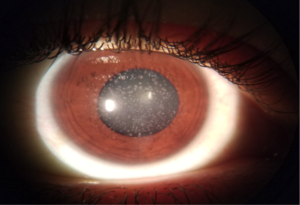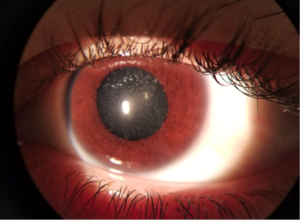Dr. Frankel’s Case of the Week:
Granular Corneal Dystrophy
A 24-year-old male presented to our clinic with a complaint of nighttime glare for the last several weeks. He

notes that when he looked in the mirror at his eyes a few days ago he saw a white spot and was concerned. His medical history was unremarkable, however, his familial ocular history was significant for severe visual impairment of his father. He is not sure why but does recall that his father underwent surgical intervention, with little to no improvement in his condition. The patient’s visual acuity was 20/20 OU with full extraocular motility and no afferent pupillary defect. His confrontational visual field were full to careful finger counting. His IOP was 14 OU. Slit lamp examination revealed central, fine, whitish granular lesions in anterior stroma/subepithelium OU. Intervening cornea was clear and the limbus was not involved. The rest of the examination was unremarkable.
This is a beautiful example of granular corneal dystrophy type 1 (GCD). Granular corneal dystrophy type 1 is an autosomal dominant condition secondary to a mutation in the TGFβ1 gene. This dystrophy results in hyaline material deposition which appears early in life as discrete “bread crumb” or “rock candy” granular opacities in the anterior corneal stroma with intervening clear spaces and sparing of the periphery. These opacities enlarge and eventually may become confluent later in life.

While some visual symptoms may occur early in life, with problems of glare and light sensitivity, visual acuity is not usually affected until the 4th decade for most patients. GCD can become visually impairing as this material coalesces and may eventually require surgical intervention. Phototherapeutic keratoplasty is usually the first line of treatment if the deposits have not formed in deep areas of the stroma. In more severe cases, lamellar or penetrating keratoplasty are recommended. However, it has been noted that these deposits can form in donor tissue, therefore these surgeries should be done with a guarded longterm visual potential.
To have your eyes checked for any major ocular diseases, make an appointment with Dr. Frankel. Give our office a call or simply schedule an appointment via ZocDoc.
On social media? Like us on Facebook & Follow us on Instagram
